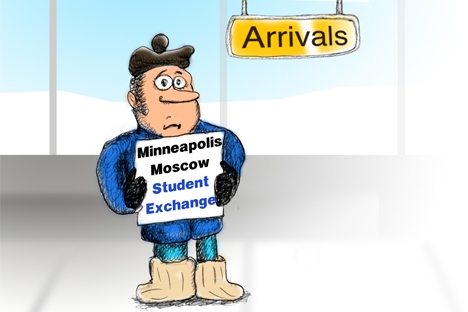U.S. elections: are relations with Russia at stake?

Drawing by Niyaz Karim
For the general public, including here in the Midwest, the answer increasingly appears to be “yes.” U.S. media proclaim that “Vladimir Putin is back,” as if he had not been guiding Russia even during the Medvedev presidency, and that negative shifts in Russian policy can therefore be expected. Meanwhile, the Republican candidate in the November election has singled out Moscow as America’s top geopolitical adversary.
Beneath the media and campaign hype, Russia remains as enigmatic as ever
for most Americans. The Russian economic presence here in Minnesota, for example, remains modest
twenty years after the demise of the U.S.S.R. Like many states, Minnesota is making a big push on exports, but the focus
is on countries other than Russia.
Minnesota is home to nearly 40,000 Russian-speaking immigrants. Many of them
emigrated from Russia in the
wake of the 1974 Jackson-Vanik amendment – which continues to restrict trade
with Russia
even though the emigration it aimed for has come to pass. These well-educated
citizens, Russia’s
loss, have contributed significantly in fields such as engineering and medical
technology. Meanwhile, the Museum of Russian Art, founded in Minneapolis in 2002, organizes well-attended
exhibits devoted primarily to art of the 19th and 20th centuries.
But beyond this, exposure to the Russia of today
is minimal. Few Russians come to Minnesota to
study, especially compared with numbers from China. By the mid-1990s, the University of Minnesota
had terminated its summer language program in St. Petersburg. In January this year, Minnesota received a
visit by administrators from the nine regional universities reorganized under
Dmitri Medvedev’s educational reform, a hopeful sign that academic exchanges
may rebound.
What impact, then, might the U.S. election have on policy toward Russia?
President Barack Obama has reset relations, leading to progress on arms control
and greater Russian cooperation on Afghanistan. But Moscow’s support
for the Assad regime in Syria and a recent crackdown on non-governmental
organizations at home have provoked further criticism of the Putin presidency.
Meanwhile, Republicans accuse Obama of having downplayed human rights abuses in
Russia and of failing to support countries in what Russia terms its “near
abroad.” When the Republican candidate declares Russia to be “without question our
number one geopolitical foe,” people are left wondering what policy changes may
be in the offing.
In the presidential campaign, both parties
hail U.S.
global leadership, and any public deviation from this stance invites
castigation as “declinism.” Yet, polls show growing popular support for
domestic priorities, for “nation building at home.” This trend is all the more
evident in a city like Minneapolis where two bridges have collapsed in recent
years and winter potholes lurk in the streets, prompting concern about
crumbling infrastructure and insufficient public investment. Public tolerance
for costly foreign and military spending may cease to be a given, with
consequences for our relations with the outside world, including Russia.
If the next administration opts to push harder against Russia, particularly on issues such as further NATO expansion or missile defense, tensions are likely to increase. Germany also vetoed the U.S. plan to speed up NATO membership for Georgia and Ukraine in 2008; revisiting the question could strain the alliance anew. The American “pivot” toward Asia risks awakening fears of encirclement in China on the eve of a major leadership transition there. Might China become more open to Russian entreaties to cooperate against U.S. policies, as appears to be happening on Syria, if both countries conclude that pressure is increasing? Foreign policy has played a minor role in presidential elections, but this may be changing here in the Midwest and elsewhere in the U.S, as voters become sensitive to the difficult tradeoffs between domestic needs and America’s global aspirations.
Thomas Hanson is University of Minnesota Diplomat-in-Residence and Oslo Center for Peace and Human Rights board member.
All rights reserved by Rossiyskaya Gazeta.
Subscribe
to our newsletter!
Get the week's best stories straight to your inbox